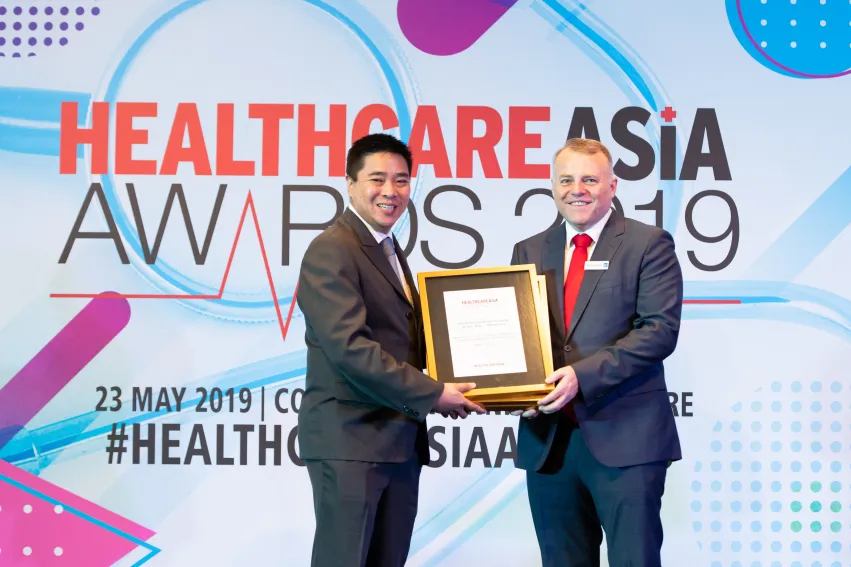
Omni Hospitals Group grabs four accolades at the Healthcare Asia Awards 2019
It was recognised as the Diagnostics Provider of the Year, as well as the Clinical Service Initiative of the
Year, Service Innovation of the Year, and Health Promotion Initiative of the Year.
OMNI Hospitals Group is responding to the rising demand for healthcare services in Indonesia by building more facilities under its chain. It also forged ties with GE Healthcare to address the increasing incidence of non-communicable diseases, such as lung cancer, heart disease, and colon cancer, where it has focused on finding innovative solutions for screening and early detection to provide better prognosis for treatment and prevent the disease from developing into a more serious phase.
As of writing, the hospital group already has four facilities in the Greater Jakarta area: one in East Jakarta (OMNI Hospitals Pulomas), one in South Tangerang (OMNI Hospitals Alam Sutera) and two in Bekasi City (OMNI Hospitals Cikarang and Pekayon), the fifth most populous city in Indonesia.
For its proactive response to meet Indonesia’s growing healthcare demand, OMNI Hospitals Group took home four awards for its home country during the recently concluded Healthcare Asia Awards: Clinical Service Initiative of the Year, Diagnostics Provider of the Year, Service Innovation of the Year, Health Promotion Initiative of the Year.
The United Nations predicts that Indonesia will have 74 million people at the age of 65 and above by 2050. This, alongside the rise of non-communicable diseases, means the demand for high quality healthcare services by private providers will continue to increase, alongside the Indonesian government’s Universal Healthcare Coverage program (BPJS JKN).
OMNI Hospitals Group’s newest hospital - OMNI Hospitals Pekayon, which started operations on September 2018 - was built to answer the increasing demand for quality health services in the City of Bekasi, with a total investment of over US$30 million. As one of the most densely populated and highly mobile cities, lifestyle changes among the middle class cause many lifestyle-related diseases, such as diabetes, heart disease, and lung cancer.
The construction of its facility in South Bekasi was driven by the increasing number of diseases that were influenced by lifestyle patterns, such as cancer, heart disease, stroke, kidney disorders, and hypertension, as well as the high demand for quality health services in the housing and corporate sectors, explained Sankaranarayanan Shrikanth, President Director of OMNI Hospitals.
According to the World Health Organization’s Cancer Country Profile for Indonesia in 2014, 21.8% of cancer deaths in men (103,000 deaths in total) and 9.1% in women (92,200 deaths in total) can be attributed to lung cancer.
The US Centers for Disease Control and Prevention suggests that the most effective screening test for lung cancer currently available is by using low-dose computed tomography (also called a low-dose CT scan, or LDCT). The U.S. Preventive Services Task Force recommends yearly lung screening with LDCT for people who have a history of heavy smoking, those who are currently smoking or have quit within the past 15 years, and those who are between 55 and 80 years old should be screened. The landmark US National Lung Screening Trial (NLST) in 2012 reported that LDCT reduces mortality from lung cancer- the 53,000-person trial found a 20% reduction in deaths from lung cancer. A recent study conducted in Europe (NELSON trial) demonstrated that LDCT screening may have even greater benefits and reduced lung cancer deaths by 26% in men and up to 61% in women. Meanwhile, 2018 statistics from the World Health Organization show that there are 61.4 million tobacco users in Indonesia.
In response to this need, OMNI Hospitals Group and GE Healthcare collaborated to pioneer the low-dose CT scan (LDCT) programme. In addition to early lung cancer detection, OMNI’s LDCT programme also provides Coronary Artery Calcium Scoring, which is an indicator of Ischaemic Heart Disease.
Other initiatives by OMNI include using CT technology to offer Virtual Colonoscopy as an alternative screening tool for Colorectal Cancer, which everyone should have from 45 years of age onwards according to the American Cancer Society recommendations in 2018, minimally-invasive Cardiac Surgery, and introduction of a Cardiac Arrhythmia Center capable of performing Cardiac Ablation procedures.
Omni Hospitals Group is owned and managed by PT Sarana Meditama Metropolitan Tbk, which is amongst the top 3 most established private hospitals in Indonesia.
The Healthcare Asia Awards 2019 was held on May 23, 2019 at the Conrad Centennial Singapore.
This year's nominations were judged by a panel consisting of Abhay Bangi, Partner, Life Sciences & Healthcare Lead, Ernst & Young; Dr. Loke Wait Chiong Executive Director, Healthcare Sector Leader, Deloitte; Dr. Zubin Daruwalla, Director, SEAC Health Industries Leader, PwC; Chin Chee Choon, Advisory Leader, Nexia TS; and Willy Leow, Partner, Risk Advisory Services, BDO LLP.
Check out the event photos during the awards night here.
If you would like to join the 2020 awards and be awarded as one of the most outstanding healthcare companies in the region, please email Julie Anne Nuñez at [email protected].


















 Advertise
Advertise


